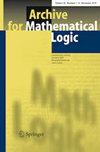费弗曼-沃特定理的变式,以及在(\prod _p \mathbb {F}_p\ )中的应用
IF 0.4
4区 数学
Q1 Arts and Humanities
引用次数: 0
摘要
利用Feferman-Vaught定理,证明了在给定离散拓扑的积拓扑中,积结构的可定义子集必须是开集的布尔组合。证明了对于具有一定性质的结构族,包括整域族,纯布尔广义积在直接积结构中是可定义的。我们使用这些结果来获得\(\prod _p \mathbb {F}_p\)的可定义子集的特征,特别是,每个公式都等价于\(\exists \forall \exists \)公式的布尔组合。本文章由计算机程序翻译,如有差异,请以英文原文为准。
Variations on the Feferman-Vaught theorem, with applications to \(\prod _p \mathbb {F}_p\)
Using the Feferman-Vaught Theorem, we prove that a definable subset of a product structure must be a Boolean combination of open sets, in the product topology induced by giving each factor structure the discrete topology. We prove that for families of structures with certain properties, including families of integral domains, the pure Boolean generalized product is definable in the direct product structure. We use these results to obtain characterizations of the definable subsets of \(\prod _p \mathbb {F}_p\)—in particular, every formula is equivalent to a Boolean combination of \(\exists \forall \exists \) formulae.
求助全文
通过发布文献求助,成功后即可免费获取论文全文。
去求助
来源期刊

Archive for Mathematical Logic
MATHEMATICS-LOGIC
CiteScore
0.80
自引率
0.00%
发文量
45
审稿时长
6-12 weeks
期刊介绍:
The journal publishes research papers and occasionally surveys or expositions on mathematical logic. Contributions are also welcomed from other related areas, such as theoretical computer science or philosophy, as long as the methods of mathematical logic play a significant role. The journal therefore addresses logicians and mathematicians, computer scientists, and philosophers who are interested in the applications of mathematical logic in their own field, as well as its interactions with other areas of research.
 求助内容:
求助内容: 应助结果提醒方式:
应助结果提醒方式:


